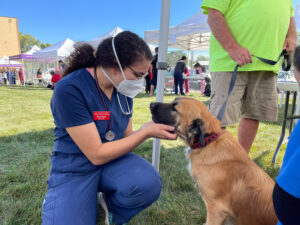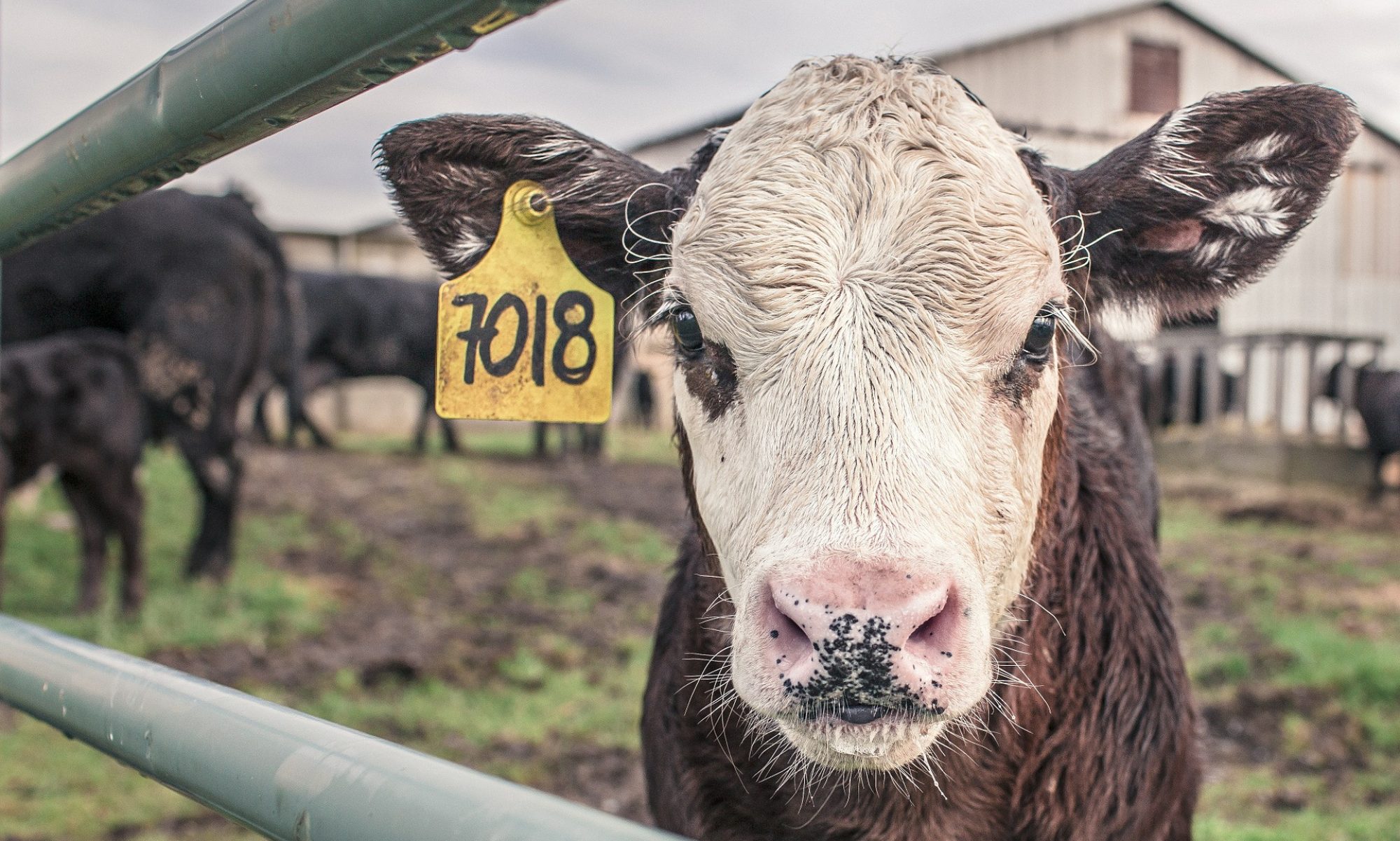
Veterinary Student Extracurricular Activities
CVM Animal Welfare Club
The Animal Welfare Club explores the science, ethics and practical applications of different issues relating to quality of life of animals and their care. The primary focus of this club is domesticated species used for companionship, food, research and entertainment. Our activities include guest speakers, field trips and preparing for the Intercollegiate Animal Welfare Judging Contest.
More Info
American Veterinary Society of Animal Behavior – Student Chapter
Educate students and the public about the importance of animal behavior as it pertains to Vet Med livestock production, safety, and pet behavior problems and or training.
More Info
AVMA Animal Welfare Assessment Contest
Aims to teach students how to assess animal welfare in varying settings across myriad species using science-based methods.
More Info
Veterinary Student Courses
🎓 – Available to outside students
1️⃣ – Available to 1st year vet students
2️⃣ – Available to 2nd year vet students
3️⃣ – Available to 3rd year vet students
4️⃣ – Available to 4th year vet students
Iowa State University
Animal Behavior
An S 537A
In 1973, the field of animal behavior was formally acknowledged when three ethologists, Konrad Lorenz, Niko Tinbergen and Karl von Frisch, were awarded the Nobel Prize. This prestigious award drew attention to ethology as a significant field of scientific research. Animal behavior is the scientific study of everything animals do, whether the animals are fish, amphibians, reptiles, birds, or mammals. It involves investigating the relationship of animals to their physical environment as well as to other organisms and includes topics such as how animals find and defend resources, avoid predators, choose mates and reproduce, and care for their young. People who study animal behavior are concerned with understanding the causes, functions, development, and evolution of behavior.
Distance education only
Contact: Dr. Anna Johnson (johnsona@iastate.edu)
1️⃣ 2️⃣ 3️⃣ 4️⃣ 🎓
Animal Welfare Clinical Rotation
VDPAM 465. Cr. 2 F.SS. (Prereq: 4th year classification in veterinary medicine; permission of instructor.
Two-week course for senior veterinary students to gain skills for collecting and interpreting animal welfare data, aid clients with identifying and achieving welfare goals, and assisting law enforcement with animal cruelty response. Field trips to food animal and companion animal facilities are mandatory.
Contact: Dr. Suzanne Millman (smillman@iastate.edu)
4️⃣ 🎓
Animal Welfare Judging and Assessment
VDPAM 365. Cr. 1. Repeatable. F.
Preparation for competition in the Intercollegiate Animal Welfare Judging Contest. Development of critical appraisal and oral communication skills in regard to animal welfare. Animal behavior, physiology, health and performance parameters, basic husbandry, housing and preventive care will be explored for select farmed, companion and exotic species. Optional field trips.
Contact: Dr. Suzanne Millman (smillman@iastate.edu)
1️⃣ 2️⃣ 3️⃣ 🎓
Behavior of Domestic Animals
BMS 403. Cr. 1. F., half semester. (Prereq: Classification in veterinary medicine or instructor permission.)
Normal and abnormal behavior of domestic animals.
Contact: Dr. Suzanne Millman, smillman@iastate.edu
1️⃣ 2️⃣ 3️⃣ 🎓
Introduction to Animal Welfare
VDPAM 312. Cr. 1. S. (Prereq: First-year classification in veterinary medicine. Core course for VM1 students.)
A continuation of the Veterinarian in Society series. The objective of this course is to develop knowledge of the fundamental principles of animal welfare, in terms of science, ethics and cultural components.
Contact: Dr. Suzanne Millman (smillman@iastate.edu)
1️⃣ 🎓
Preceptorship in Animal Welfare
VDPAM 466X. Cr. 1 to 6. F.S.SS. (Prereq: Fourth year classification in veterinary medicine; permission of instructor.)
Preceptorship in animal welfare with emphasis on animal welfare assessment, policy and problem solving. Mentors include practicing veterinarians, researchers, and/or animal welfare organizations.
Contact: Dr. Suzanne Millman (smillman@iastate.edu)
4️⃣ 🎓
Shelter Medicine
VCS 305. Cr. 1. S. (Prereq: First year classification in Veterinary Medicine or with permission of instructor.)
An elective course designed to educate the veterinary student about issues of relevance to companion animal population and shelter medicine and welfare.
Contact: Dr. Joyce Carnevale (joycec@iastate.edu)
1️⃣ 2️⃣ 3️⃣ 🎓
University of Minnesota
Animal Welfare Science and Ethics
ANSC 5015. Cr. 3.
This multidisciplinary course helps students develop an intellectual framework for understanding and interpreting issues involving animal welfare and ethics of animal use in agriculture, science and society.
Overview of Dairy Production Medicine
CVM 6831. Cr. 2.
Gives students the background necessary to promote animal welfare, prevent disease and assist clients in making decisions that enhance their farms productivity and financial well-being.
Contact: Dr. Gerard Cramer (gcramer@umn.edu)
Swine and Dairy Welfare
CVM 6987. Cr. 2.
Veterinarians have unique professional responsibilities for advising clients on animal welfare issues, for the development and assessment of compliance programs with animal welfare certification programs, for assisting law enforcement in animal cruelty response, and for providing expertise for animal welfare decision-making by domestic and international policy makers, retailers, businesses and non-governmental organizations. Focusing on the role of welfare in swine and dairy production, this two-week elective will provide senior veterinary students with the skills to collect and interpret animal welfare data, aid clients with identifying and achieving welfare goals, and incorporate welfare into practice.
Contact: Dr. Gerard Cramer (gcramer@umn.edu)
Kansas State University
Animal Care and Welfare
VAP 891. Cr. 1. (Elective available to 2nd year and DVM students)
This course describes the veterinarian’s role in protecting the health and welfare of animals. Students will be introduced to the major philosophical positions of animal use. The evolution of animal welfare science will be discussed and students will learn how to assess the welfare of companion, laboratory, zoo and food animals. Common causes of reduced animal welfare and ethical dilemmas will be covered.
Contact: Dr. Abbie Viscardi (aviscardi@vet.k-state.edu)
North Carolina State University
Clinical Behavior and Welfare for Dogs and Cats Electives
VMC 919. Cr. 1. (Prerep: VMC 927 or equivalent)
This is a one-credit course in clinical veterinary behavioral medicine and welfare, with an emphasis on diagnosis and treatment of behavior problems of dogs and cats. The course will build upon the foundation of normal versus abnormal behavior and learning theory of VMC 927. This course will focus on the recognition of common problem behaviors in dogs and cats and how to approach a behavior problem with a systematic Problem Oriented Approach [POVMR]. The presentation, proposed etiology and pathogenesis, differential diagnosis, and plan formulation- including diagnostic, treatment, and education plans, will be discussed for common problems. Behavioral medication and complementary products will be included when discussing treatment plans. Additionally, the impact on animal welfare and the human-animal bond will be discussed. Problems to be reviewed include noise aversion, separation anxiety, compulsive disorders, housesoiling, fear and anxiety related problems, problems presenting with aggression, cognitive dysfunction, and some nuisance behaviors.
Introduction to Companion Animal Behavior
VMC 927. Cr. 2. (Prereq: Doctor of Veterinary Medicine majors only.
This course explores the behavior of companion animals from a veterinary perspective. An emphasis is placed on behavior as an indicator of welfare and health, humane handling of animals, prevention of behavior problems, and treatment of common behavior problems. In addition the nature of human-animal bond and ethical issues relating to human-animal interactions will be discussed. Students will learn how to diagnose and treat common behavior problems on the basis of video-rich case presentations, lecture material, and class discussion. This course is restricted to students enrolled in the DVM Curriculum
Veterinary Ethics and Animal Welfare
VMC 931. Cr. 2. (Prereq: Currently enrolled DVM student.
This course will explore the major ethical issues confronting the practices of veterinary medicine, biomedical science, and animal welfare. Students will become familiar with legal and institutional positions, consider and debate opposing arguments on the various topics, and examine relevant case studies. Provides the basic leadership and operational training necessary to become a Credentialed responder for the State of North Carolina. Limited to DVM students or by permission of instructor.
The Ohio State University
Introduction to Animal Behavior
VMCOLL 6641. Cr. 2. (Prereq: First year standing veterinary student.)
Basic concepts and applications of animal behavior with implications for welfare. Emphasis on domesticated animals,with some coverage of laboratory and wild animals in captivity.
Contact: Leanne Lilly (lilly.136@osu.edu)
Introduction to Animal Welfare
VMCOLL 6565. Cr. 1. (Prereq: Second year standing veterinary student).
Historical, philosophical and scientific developments that have led to our current understanding of animal welfare and how it should be assessed. Welfare issues related to the different uses of animals in society.
Contact: Mark Flint (flint.71@osu.edu)
University of Prince Edward Island
Animal Behaviour and Welfare
VBS 1030. Cr. 2.
This course introduces fundamental principles of animal behaviour and presents an overview of animal welfare concepts relevant to the practice of veterinary medicine. Restriction: Student must have first year standing in the DVM program. Two hours of lecture per week.
Contact: Dr. Katy Proudfoot (kproudfoot@upei.ca)
Large Animal Health Management
VHM 4230. Core rotation. This is a rotation involving the Farm Service, epidemiology, and Canadian Food Inspection Agency Faculty in the Department of Health Management. Students will explore contemporary issues relating to food animal practice including regulatory components. There will be a focus on development of problem-solving skills as they relate to herd health management, reproductive management, animal welfare, food safety, and one-health aspects of food production.
Contact: Dr. Dan Hurnik (hurnik@upei.ca)
